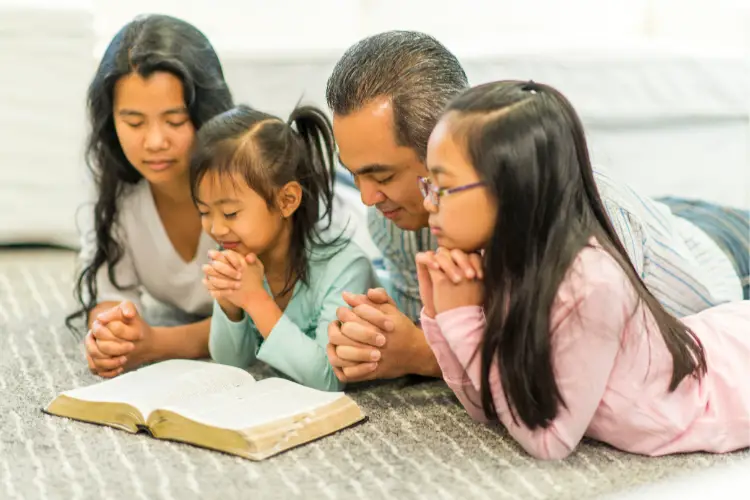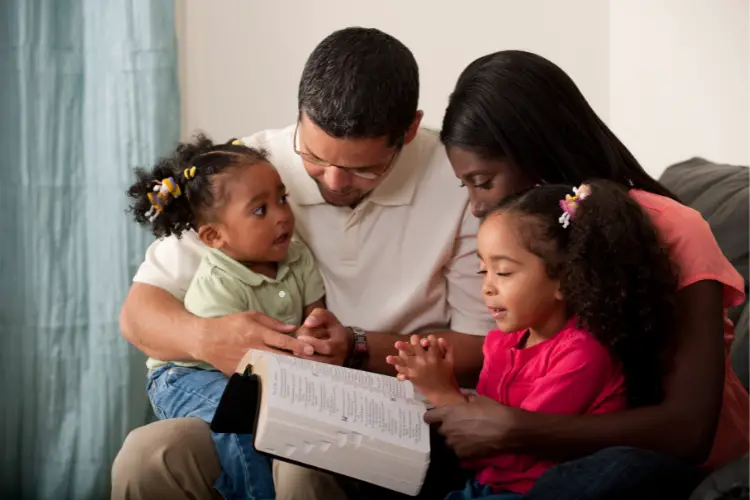The institution of marriage is deeply rooted in religious traditions, serving as a cornerstone for societal and spiritual life. In this blog post guide, we will be looking at the religious understanding of marriage roles and responsibilities, exploring how these sacred bonds are shaped by faith.
We examine the spiritual dimension, biblical foundations, and the reflection of Christ’s love within the marital union, as well as the upbringing of children in faith and the diverse theological perspectives on marriage practices.
Key Takeaways
- Marriage is a sacred union with spiritual significance, emphasizing commitment, fidelity, and mutual support towards salvation, often symbolized as a ‘small church’ within the community of the faithful.
- Biblical teachings, especially from the Gospels and Ephesians 5:22-33, provide a framework for marital roles, advocating for mutual love, respect, and the reciprocal responsibilities of both partners.
- Christian marriage is a reflection of Christ’s love for the Church, calling for sacrificial love from husbands and respectful submission from wives, fostering a harmonious and Christ-centered union.
- Raising children within the faith is a pivotal marital responsibility, where parents lead their family in religious values, nurturing the next generation as part of their spiritual duty.
- Theological explanations and practices regarding marriage can vary, but the overarching principle is to honor the sanctity of marriage, navigating contemporary challenges with a foundation in religious teachings.
The Spiritual Dimension of Marriage

The Sacramentality and Uniqueness of Marriage
In the Christian tradition, marriage is not merely a social contract but a sacramental union. The sanctity of marriage is rooted in its reflection of divine love, a concept upheld across various denominations.
While the Catholic and Orthodox Churches emphasize the necessity of an ecclesiastical context for celebrating a sacramental marriage, this requirement has evolved differently throughout history.
The sacramentality and uniqueness of marriage are affirmed by both Catholic and Orthodox teachings, despite differences in practice and theological explanation. These differences notably impact the formation and dissolution of the marital bond.
The understanding of marriage as a sacrament implies that it is a visible sign of an invisible grace, conferring a special status upon the couple. It is recognized that the marriages between two baptized individuals, whether Protestant or Orthodox, are considered sacramental by the Catholic Church.
This recognition extends to the transformative power of marriage, which is seen as a vocation with redeeming effects on the individuals and the community.
Navigating Divorce and Remarriage
The teachings found in the Gospels offer a profound perspective on the ethical and moral considerations related to divorce and remarriage. These teachings emphasize the sanctity of marriage and the implications of marital dissolution within the divine framework.
Discernment and ethical awareness are crucial when entering into a new marital union following divorce.
The Gospels present Jesus’ teachings on remarriage, stating, “And I say to you: whoever divorces his wife, except for sexual immorality, and marries another, commits adultery” (Matthew 19:9). This passage has led to significant debate among believers, particularly regarding the question: Remarriage After Divorce–Is it Adultery?
Believers are called to navigate these complex and sensitive aspects with wisdom and compassion, seeking to honor the commitment made before God while also acknowledging human frailty and the possibility of redemption and new beginnings.
While the Bible provides guidance, it is also important to consider the diverse interpretations and practices within the Christian community:
Marriage as a Reflection of Divine Design

In the divine blueprint, marriage is more than a mere social contract; it is a sacred covenant that mirrors the unity and love inherent in the divine nature.
The purpose of marriage is to reflect the image of God, as outlined in the creation narrative of Genesis. This image is expressed through the complementary partnership of husband and wife, each reflecting different attributes of God’s character.
- The union of man and woman in marriage symbolizes the relationship between Christ and the Church.
- Marriage serves as a platform for demonstrating God’s intentions for humanity, including companionship, procreation, and spiritual growth.
- Through marriage, couples have the opportunity to manifest God’s love, grace, and creativity in their lives.
Marriage, therefore, is not solely for the benefit of the individuals involved but is also a testament to the divine design and purpose. It is a living example of the harmonious relationship intended by God from the beginning, despite the challenges posed by human imperfection.
Biblical Foundations for Marital Roles

Mutual Love and Respect in the Gospels
The Gospels present a vision of marriage that is deeply rooted in mutual love and respect. This vision is not merely an ideal but a practical guide for couples seeking to embody the principles taught by Jesus Christ.
The emphasis on partnership within the marital union is clear, with both husbands and wives called to contribute equally to the flourishing of their relationship.
The teachings of the Gospels provide a blueprint for marriage that balances the spiritual with the practical, ensuring that love and respect are not abstract concepts but lived realities within the sacred bond of marriage.
The following points highlight key aspects of this vision:
- The reciprocal responsibilities of husbands and wives
- The importance of fostering a harmonious and fulfilling relationship
- The portrayal of marriage as a reflection of the union between Christ and the Church
Each aspect underscores the comprehensive framework for marital roles that the Gospels offer, guiding believers in their journey towards a Christ-centered marriage.
Ephesians 5:22-33: A Blueprint for Marriage
Ephesians 5:22-33 serves as a profound blueprint for Christian marriage, delineating the roles and responsibilities of both husbands and wives. Husbands are called to love their wives sacrificially, as Christ loved the Church, while wives are encouraged to submit to their husbands with respect and love.
The passage emphasizes a mutual submission and sacrificial love, reflecting the unity and commitment expected in a marital relationship.
The following points outline the key aspects of this blueprint:
- Mutual love and respect as foundational principles
- The husband’s role as a loving and selfless leader
- The wife’s role in respectful submission and support
- The marriage as a reflection of Christ’s relationship with the Church
Understanding and applying these principles can lead to a harmonious and Christ-centered union, countering worldly misconceptions about marriage.
Countering Worldly Misconceptions About Compatibility
In the quest for a lasting union, the worldly view of marriage often perpetuates the misconception that compatibility is the cornerstone of a successful marriage.
However, this view can be misleading and oversimplified. The biblical perspective suggests that marriage is not about finding the perfect match but about committing to grow and nurture the relationship through love and sacrifice.
- Lie 1: “If you’re not compatible, you may have married the wrong person.”
- Truth: Marriage is a covenant that thrives on commitment, not just compatibility.
The focus on compatibility can overshadow the importance of commitment, which is the true foundation of a marital covenant. It’s about choosing to love and honor your partner in all circumstances.
Understanding that marriage is a journey of growth and mutual support can help couples navigate the challenges that arise, countering the lie that incompatibility signals a mistake. It’s a daily decision to uphold the vows made and to reflect the steadfast love that the Bible advocates.
Reflecting Christ’s Love in Marriage

The Analogy of Christ and the Church
In the Christian understanding of marriage, the relationship between Christ and the Church sets a profound example for marital love. Christ’s sacrificial love for the Church is mirrored in the call for husbands to love their wives selflessly.
Just as Christ gave Himself up for the sanctity and unity of the Church, husbands are encouraged to prioritize the well-being and holiness of their marriage.
Submission in this context is not about inequality or dominance, but about a respectful and loving response to sacrificial love. Wives are called to respect and submit to their husbands, not as a sign of weakness, but as a mutual and reciprocal act of love, reflecting the harmony and dedication found in Christ’s relationship with the Church.
The marital bond is thus seen as a living symbol, a tangible expression of divine love that is meant to be nurturing, protective, and elevating for both partners.
The following points outline the key aspects of this analogy:
- The husband’s role is to love as Christ loved the Church—sacrificially and unconditionally.
- The wife’s role is to respect and respond to this love, just as the Church respects Christ.
- Together, they form a union that reflects the unity and diversity of the body of Christ.
Sacrificial Love and Respectful Submission

In the Christian conception of marriage, sacrificial love and respectful submission are intertwined, reflecting the relationship between Christ and the Church.
Ephesians 5:21-33 provides a blueprint for this dynamic, calling for husbands to love their wives with the same selfless devotion that Christ showed for the Church. This love is not merely emotional but is expressed through actions that prioritize the well-being and sanctification of one’s spouse.
Mutual submission, as described in the Scriptures, requires a balance of love and respect that transcends societal norms. It is not about power dynamics but about serving one another in love, with each partner considering the other’s needs as paramount.
The responsibilities outlined for husbands include a call to sacrificial love, mirroring the love Christ has for the Church. This goes beyond mere affection, encompassing a commitment to the spiritual and emotional nourishment of their wives.
Wives, in turn, are encouraged to submit to their husbands, not as a sign of inferiority, but as a harmonious response to their husband’s loving leadership.
- Love and Sacrifice: Husbands are to love as Christ did, selflessly and unconditionally.
- Respectful Submission: Wives are to submit respectfully, as a complement to their husband’s role.
- Mutual Well-being: Both partners are to prioritize the growth and well-being of each other, laying aside personal interests.
Creating a Christ-Centered Marital Union
In the pursuit of a Christ-centered marital union, couples are called to embody the spiritual unity that is so deeply rooted in Christian faith. This unity is not just a merging of lives, but a profound merging of souls, where shared values and faith in God become the bedrock of the relationship.
A Christ-centered marriage is one where both partners actively strive to reflect the sacrificial love that Christ has for the Church. Faith in Jesus Christ is a non-negotiable cornerstone of Christian marriage, guiding the couple towards a harmonious life together.
As they navigate the challenges of life, the duties of a husband and wife go beyond the worldly view of compatibility; they are to enjoy and love each other deeply, as life can be arduous but love makes the journey worthwhile.
In a true Christ-centered marriage, the love between the couple is an opportunity to fulfill their vocation to salvation, mirroring the mystery of the Kingdom of God.
- Spiritual Unity: Reflecting a bond ordained by God.
- Sacrificial Love: Emulating Christ’s love for the Church.
- Marital Fidelity: Committing to lifelong unity and mutual assistance.
- Procreation and Nurturing: Raising children as an icon of the Church.
Raising Children Within the Faith

Procreation and Nurturing as Marital Responsibilities
In the sacred context of marriage, procreation is more than the biological act of having children; it is a divine calling to extend the ‘one flesh’ union into a godly heritage.
Couples are encouraged to embrace this aspect of marriage with the understanding that it is not solely about the continuation of individuals but the fulfillment of societal and cosmic obligations. For those who are able to have children, the responsibility does not end at birth.
Nurturing encompasses providing for the physical, emotional, and spiritual well-being of the offspring. This holistic approach ensures that children are raised in a manner that reflects the love and teachings of Christ, preparing them to live for Him and contribute positively to the community.
The Gospels underscore the importance of both parents in the nurturing process, highlighting the role of the husband in provision and the wife in fostering a harmonious and fulfilling relationship within the family.
While some couples may face challenges in bearing children, their marriage remains complete and purposeful. The church acknowledges various paths to parenthood, including adoption, as equally valuable in building a family that honors God.
Leading a Family as ‘A Small Church’

In the context of Christian marriage, the family is often likened to a small church, where the principles of faith are lived out in the intimacy of home life. The family unit serves as a microcosm of the Church, embodying its values and traditions within the daily interactions of its members.
The family, as a small church, is tasked with the sacred duty of nurturing faith and love, creating a foundation for spiritual growth and moral development.
Parents are entrusted with the role of shepherds, guiding their children through the complexities of life while instilling in them the virtues of the Gospel. This leadership is not about authority, but about servanthood and sacrifice, mirroring the servant leadership of Christ.
- Encourage open communication about faith
- Model prayer and worship in daily life
- Foster a spirit of service and charity
- Create traditions that celebrate and teach religious milestones
The journey of leading a family as a small church is both challenging and rewarding, requiring a balance of wisdom, love, and respect. It is a journey that reflects the broader human experience and enriches the spiritual life of each family member.
Instilling Religious Values in the Next Generation
The task of instilling religious values in children is a cornerstone of a faith-filled marriage. It is not merely about teaching them the rituals and doctrines, but also about nurturing a deep, personal relationship with the divine. Parents play a pivotal role in this spiritual journey, serving as the primary educators in faith.
- Parents should be unafraid to share the commonalities of their faith, while also being open and respectful where beliefs diverge.
- It’s important to instill in children a respect for all religions, explaining that different people have different beliefs.
- The spiritual formation of children, especially in mixed marriages, should take into account the strength of the religious convictions of the parents and the unity and stability of the family.
In the delicate balance of imparting faith, parents must navigate their own convictions with the needs of their children, fostering an environment where spiritual growth is encouraged and love is the guiding principle.
The ultimate goal is to raise children who not only understand their religious heritage but also respect the diverse tapestry of faiths around them. This requires a commitment to ongoing dialogue, support through connections with other families, and placing a strong emphasis on love and the needs of others.
Marriage Practices and Theological Perspectives

Contemporary Challenges in Marriage
In the face of modernity, the Church grapples with articulating the sacredness of marriage in a way that resonates with today’s diverse societal norms. The shift towards civil marriage and the questioning of matrimony’s relevance pose significant challenges.
- The rise of civil marriage as a preferred option over religious ceremonies.
- The perception of marriage as an optional or outdated institution.
- The need for the Church to maintain its doctrinal integrity while addressing contemporary realities.
The Church’s role is not only to uphold the sanctity of marriage but also to provide meaningful guidance that aligns with the evolving cultural and legal landscapes.
As the institution of marriage evolves, the Church must adapt its pastoral care to support believers in understanding and fulfilling their marital roles, amidst the changing tides of societal values and legal definitions.
Differences in Practice and Theological Explanation
The diversity of marital practices across Christian denominations is not merely a matter of custom but reflects deeper theological interpretations.
While the sacramentality and uniqueness of marriage are widely recognized, the ecclesial context required for marriage varies significantly, influencing how the marriage ceremony and married life are approached.
- Catholic and Orthodox traditions often emphasize the necessity of a specific ecclesial setting for the marriage to be recognized.
- Protestant denominations may have more varied practices, with some allowing for greater flexibility in the context of marriage ceremonies.
The practical realization of these differences can have profound implications on the formation and dissolution of marital unions within the respective churches.
The contemporary cultural and ecclesiastical context further complicates these differences. Historical practices and theological principles are being re-evaluated in light of modern societal norms and the individual experiences of clergy and laity alike.
Honoring Marriage in Diverse Christian Traditions

In the tapestry of Christian traditions, honoring marriage takes on various forms, yet the core sanctity of the union remains a common thread. The Responsibilities Husbands and Wives Have to One Another in a marriage are pivotal in maintaining this sanctity.
The husband’s role is often seen as one to lead and love, while the wife’s role is to submit to and respect her husband, reflecting a mutual commitment to uphold the spiritual essence of their union.
- The Eastern Orthodox Church emphasizes the sacramental nature of marriage, viewing it as a path to holiness.
- Catholicism holds marriage as a sacred covenant, a sacrament that signifies the unbreakable bond between Christ and the Church.
- Protestant denominations vary in their views, but many stress the importance of marital vows and the covenantal relationship.
Marriage within diverse Christian traditions is not just a legal contract but a spiritual journey that embodies love, sacrifice, and mutual support. The pastoral care of spouses and the guidance provided to them should be reflective of this profound understanding.
While practices differ, the underlying principle is that marriage is a divine institution meant to mirror the love of Christ for the Church. It is this love that sustains and enriches the marital bond, guiding couples through the challenges of life.
Conclusion
In exploring the religious dimensions of marriage, we have seen how faith traditions provide a rich tapestry of roles and responsibilities for husbands and wives. The spiritual framework offered by religious teachings emphasizes a union grounded in mutual love, respect, and the shared pursuit of salvation.
This sacred partnership is not only about the personal fulfillment of the couple but also serves as a reflection of divine love and a testament to the community of believers. Through the lens of religion, marriage is more than a social contract; it is a holy union that mirrors the sacrificial love of Christ for the Church and calls for a lifelong commitment to fidelity, unity, and the nurturing of family life.
As society grapples with changing views on marriage, the religious perspective remains a steadfast beacon, guiding couples to honor their vows and uphold the sanctity of this blessed covenant.
FAQs:
What is the spiritual dimension of marriage in a religious context?
In a religious context, the spiritual dimension of marriage is expressed through a commitment to marital unity, lifelong fidelity, and mutual assistance towards salvation. It may also involve the procreation and nurturing of children, reflecting the divine design and functioning as a small icon of the Church.
How do the Gospels frame the roles of husbands and wives in marriage?
The Gospels provide a framework that emphasizes mutual love, respect, and partnership as foundational principles for husbands and wives. This perspective highlights the reciprocal responsibilities of both partners in fostering a harmonious and spiritually fulfilling marital relationship.
What does Ephesians 5:22-33 say about marital roles?
Ephesians 5:22-33 outlines the roles and responsibilities within a marriage, calling husbands to love their wives sacrificially and wives to submit to their husbands lovingly and respectfully. This passage serves as a blueprint for a harmonious and fulfilling marital relationship.
How should differences in marriage practices and theological explanations be approached?
Differences in marriage practices and theological explanations should be approached with an understanding of their seriousness, as these disparities affect the formation and dissolution of marital unions. It’s important to affirm the sacramentality and uniqueness of marriage while addressing these differences respectfully.
What does it mean to reflect Christ’s love in marriage?
Reflecting Christ’s love in marriage means that the union of husband and wife should mirror the sacrificial love of Christ for the Church. Husbands are called to love their wives selflessly, and wives are to respect and submit to their husbands, aiming to create a harmonious and Christ-centered marital union.
What is the biblical view on compatibility and choosing a marriage partner?
The biblical view challenges the worldly misconception that compatibility is the sole indicator of a successful marriage. Instead, it encourages a lifelong commitment to love, respect, and mutual support, suggesting that challenges in marriage can be overcome through a Christ-centered approach rather than mere compatibility.


